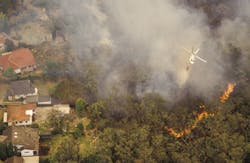Wildfires can have negative impact on drinking water sources
Wildfires of unprecedented magnitude and severity have increased in frequency in the last few years, raising concerns about the quality of local natural resources, such as water, the Water Research Foundation (WRF) and the Canadian Water Network (CWN) claim in a joint report.
Wildfires can have a negative impact on water supply, water quality and stream health for decades, increasing the likelihood that drinking water treatment processes will be affected, the two organizations said.
The findings of the report were supported by information, gathered during a two-day workshop in Alberta, featuring 30 leading scientists and practitioners from the United States and Canada.
"Wildfires can have catastrophic impacts on drinking water sources, ecosystem health and the ability for water providers to deliver clean, safe drinking water to communities," CWN executive director Bernadette Conant, said.
"Forested regions often account for a substantial proportion of a local population's water supply," WRF executive director Rob Renner said. "Our goal in working with Canadian Water Network on this project was to address what water supply and treatment, public health and other emergency preparedness professionals need to most effectively plan for and address wildfire related water supply and treatment issues," he added.
In the report, the researchers conclude that in regions where forest and climatic conditions are already conducive to wildfires there is high risk of water contamination and these risks are likely to increase due to climate changes. But effective forest management can minimize these risks.
Therefore, there is a clear need to integrate wildfire and watershed management to protect drinking water sources in areas, where the risk of severe wildfires is high and water supplies are vulnerable, it said in the report.
